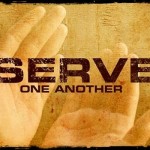Defining and describing organic church life
Not long ago, I came across Nathan who has a blog called “Joined to Him.” He is writing a series of posts called “Why I’m Pro-Organic Church.” (Here are “Part 1,” “Part 2,” and “Part 3.”) I don’t know if there will be more parts to Nathan’s series, but these three provide a great definition and description of what organic church means.
In the first post of the series, Nathan describes his own journey. I’ve always found it interesting and encouraging that many people have started from very different places but have come to very similar conclusions concerning the church.
At one point, Nathan describes some of the questions he started asking:
While this was happening I was asking myself many questions about church. I was asking if the modern day church was the church Christ died to obtain and Paul died to plant and establish. I wondered why we did church the way we did? Why we have a pastor, Sunday service, offering, pews, ten minutes of singing followed by an hour long sermon delivered by the same person each and every week? Where did this all come from? Is there something more?
In the second post of the series, he defines what he means by organic church. This is extremely important, especially for the audience that Nathan is writing for (his friends and family primarily).
Here is part of Nathan’s definition:
By “organic church,” I mean a non-traditional church that is born out of spiritual life instead of constructed by human institutions and held together by religious programs. Organic church life is a grass roots experience that is marked by face-to-face community, every-member functioning, open-participatory meetings (opposed to pastor-to-pew services), non-hierarchical leadership, and the centrality and supremacy of Jesus Christ as the functional Leader and Head of the gathering.
Finally, in the third post of the series, Nathan describes several practical aspects related to organic church. This is also extremely important, because it takes “organic church” out of the concept or ideal phase and puts feet to it.
For example, here is one of Nathan’s “practical characteristics”:
The second practical characteristic is that the meeting is open and every member can function as they are lead by the Christ the Head, through the Spirit. This is in line with the early church gatherings spoken about in 1 Cor. 14, where every member could bring a song, hymn, teaching etc. to the gathering for the building up of the church. Practically, members might write songs together or alone, exalting Christ or an aspect of His riches. The song would be brought and sung together. Songs might happen spontaneously. People might write poems glorifying Christ. Somebody might feel burdened to bring a teaching to the group, etc. All things are done for the building up of the church. Each member is allowed to function in their God given roles. Each member is an active priest in the priesthood of all believers.
I encourage you to read all of Nathan’s posts. You may not agree with everything he writes, but I think you’ll find much to encourage you in your own journey with Jesus Christ and among your brothers and sisters in Christ.
The world looked on in dismay…
I was very excited a couple of days ago when I read a post by Kathleen at “Church in a Circle” called “This Easter, let’s set aside our divisions and practise true religion.” Besides misspelling the word “practice” (When will people from other English-speaking countries learn how to spell words like “practice”?), this is a very good post, and an excellent catalyst for thinking about the unity we have in Jesus Christ (and only in Jesus Christ).
As you begin to read and think about Kathleen’s post, keep this quote from Jesus in the back of your mind: “I do not ask for these only, but also for those who will believe in me through their word, that they may all be one, just as you, Father, are in me, and I in you, that they also may be in us, so that the world may believe that you have sent me.” (John 17:20-21 ESV)
Now, this is how Kathleen begins her post:
In my youth, it seemed as though entire church denominations were at war with one another. Evangelicals were certain Catholics had it completely wrong. High Anglicans looked down upon low expressions of church. Baptists thought Pentecostals were from another planet. God’s people focussed on their theological differences, rather than the core beliefs that drew them all to the same God. The world looked on in dismay, and quietly retracted any expectation of discovering God through this violent, divided “religion”.
Did you notice the difference? Jesus said that, because of our unity, “The world may believe that you have sent me.” In contrast, Kathleen says (and rightly so, I think), “The world looked on in dismay.” Well, I think some look on in dismay; some look on in apathy; some look on in contempt. Meanwhile, we keep separating from one another, fighting with one another, refusing to serve other together, and calling each other many names (besides brother or sister).
When I was in Ethiopia a few years ago, one of the things that my brothers and sisters in Christ there could not understand is how followers of Jesus Christ could live next door to one another, work together, go to school together, etc., and yet refuse to serve God together, refuse to treat each other like brothers and sisters in Christ, refuse to live as the church of Jesus Christ together. They just could not understand our divisions.
Here’s the thing… refusing to face our differences will not actually help the problem with divisions among the church.
There’s only one thing that will ease these divisions: focusing on and living in the unity that we already have in Jesus Christ despite our differences.
I’d encourage you to read Kathleen’s post, then consider how you could demonstrate the unity you have with the brothers and sisters in your life… those who are all around you… those you may not think about very often because they are different than you.
Walking as if other people are important
Love one another. Consider others more important than yourself. Serve one another. Care for one another. Encourage one another. Teach one another. Edify one another.
Did you know that there’s an important precept underlying all of the instructions above? Yep. That precept is this: For those who follow Jesus Christ, other people are important.
My friends Paul are Laurel moved to the Congo last year. They are working with Wycliffe Bible Translators, and they’re currently working with several local languages. But, it seems they are learning much more than just languages. Last week, they published a post called “Convicting Language Lesson.”
Here’s how they described an important lesson they’re learning:
A few days ago, I was sitting in the office along with the Komo translators when suddenly one of them, Tony, stood up and walked brusquely across the room with a very determined look on his face. Then they all started laughing. After a minute or two, Amisi, the director asked me, “Do you understand what we are talking about?” When I said no, he began to explain a very interesting verb to me. In Komo, they have a word for going somewhere with such determination that you don’t even stop to greet people on the way. He said “You know, like you foreigners often do” . . . Ouch! It’s true, isn’t it? We are often more goal oriented than people oriented and it really sticks out in a culture like this. Nonetheless, it’s a pretty cool verb.
There’s not much left to say after that, is there?
The way we live… even the way we walk from place to place… demonstrates whether or not we think people are important.
I’ve been to a couple of places around the world that are not event oriented (like most people are here in the United States). I’ve learned so much from the people of these culture. Primarily, I’ve learned how to live in a way that shows that other people are important. I’ve learned to talk to people in a way that shows that I care more about what they have to say than what I plan to say next.
Of course, sometimes my old American habits come to the surface. But, I want to live – and even to walk – in a way that shows other people that they are important to me.
But, then, they have to actually be important to me first…
Learning from what God is doing in others’ lives
I love listening to the life-stories that my brothers and sisters in Christ share. I get to hear these stories often: over coffee or dinner, on the phone, walking/running or playing in the park, even on Sunday when we gather with the church. There’s a power hearing what God is doing in someone’s life.
Over the last few days, I’ve read a few posts in which the blogger in sharing other people’s stories. I love that, too!
Here are a few that have encouraged and challenged me.
Gavin at “Simple Church Alliance” shares part of Jeff’s story in a post called “An Encouragement From Pendleton, KY.” In describing part of the journey that God is leading them in, Jeff writes:
As the weather slowly starts to turn over to the warmer months, our family is planning to spend Sunday mornings at a local park to see who we can meet, get to know better, build relationship with, pray for, etc. We started doing this just as the weather got bad last year, and we know this can be a great place to meet families who are disconnected from the Sunday morning church routine, for whatever reason. We’re not sure what God will do, but we’re going to show up and find out. I appreciate your prayers with us about this.
Joe at “More Than Cake” shared part of Amber’s wonderful story in a post called “Scars that Bring Glory – A Woman’s Perspective.” Amber writes about a difficult, painful time in her life:
In the beginning I prayed for what I wanted. Lord, take away the pain and make it as if it had never happened. Please heal my wound and make me as though I were new again. I knew it was in his power. As time passed, God showed me that to heal my pain and not leave a scar would defeat the purpose and take away from His glory and the good work that He had done. We had ugliness in our lives before the actual wound even took place. I was, in essence, asking to be placed right back there where I had started. God used a deep wound to create something more beautiful than what had been there before. The scar is part of the beautiful creation He stuck in place of the old. The scar is a reminder of what the original product was and how He had taken such imperfection and created something beautiful in its place.
Finally, in a new site (to me) called “Mennonite World Review,” Bethany tells part of her story in a post called “MWR: Define ‘church’“:
Back to last Sunday. After the killer breakfast, book reading and house straightening, we headed to our small group at 2 p.m. Our masks and guards were at home. I showed up in jeans, slippers, a sweatshirt and rocked a semi-greasy, mini-pony tail. I read verses on my iPhone and didn’t feel the need to explain that I wasn’t texting or surfing Facebook. We shared. We cried. We asked questions. We gave suggestions. We prayed with and for each other. And every two months we serve together. We meet in homes and don’t have mailboxes, but we communicate throughout the week. Without paper. Next time we’re even going to scrub each other’s feet and stuff after communion. Is that church? (HT: Robert)
I hope you enjoyed these stories as much as I did. (And, please click the links to read the whole story…)
Where are you sent?
Tim at “Synerchomai” has written a very good post called “Missional Because We’re Sent.” As you can probably tell from the title of this post, Tim is writing about living as those who are sent by God into the world.
I love that Tim is writing about this subject. Well, I love that anyone is writing about this subject, but especially Tim because the focus of his blog (like the focus of my blog) is gathering together with our brothers and sisters in Christ. But, like I’ve also learned, Tim has discovered that it’s difficult to talk about gathering without also talking about being scattered into the world.
Here’s a small part of Tim’s post:
What really struck me was that believers who otherwise would have had nothing to do with one another were becoming excited about collaborating together to proclaim and demonstrate the gospel.
From this meeting together we will scatter, each to our own communities. That is our missional function. We’ll hope to gather again, to build one another up in a way that is truly organic. There’s something here I don’t quite understand: how we long to be together as brothers and sisters, yet we are sent out into the communities where God has placed us.
I think Tim is investigating something (or 2 things) that God builds into all of his children: a desire to gather together and a desire to go to others. Sometimes, we live as if these are exclusive issues, even giving special names (like “missionary”) to those who are called to go, while us normal Christians are called to go.
But, in reality, and like Tim says, we ARE all called to go into the world. We’re all sent by God as missionaries wherever we are.
Sure, God sends some around the world or across the country. He doesn’t send us all around world or across the country, but he does send us all.
So, the question is not, “Am I sent?” The question is, “Where am I sent?” or perhaps even better, “To whom am I sent?”
These are questions that we should all consider. Our brothers and sisters in Christ can help us with these questions when we gather together. But, we can only live them out when we scatter.
Talking about being sent is not enough; we must live sent.
So, where are you sent? To whom are you sent?
Google Reader is dead. Long live Feedly!
In case you haven’t heard, Google is killing Google Reader on July 1, 2013. That’s only a couple of months away. If you’re like me and use Google Reader daily to keep up with many (too many) blogs, then this news may have come as a shock.
(By the way, in case you don’t know, Google Reader is a feed reader. It’s a way to keep up with new blog posts – as well as other new items published on the internet from many different sources.)
When I first heard the news, I was a little shocked then perplexed… What would I do about all those blogs? I certainly can’t surf to each one of them to see if anything new had been added. So, I asked on Facebook, “What should I use now that Google Reader is being killed off?”
I received several suggestions and looked a few briefly.
Then, I tried Feedly, and I LOVE IT! Seriously.
(No, I’m not getting anything in return for saying this, and no one has asked me to review or recommend Feedly.)
In fact, I think I like Feedly better than Google Reader. If Google announced today that they changed their mind about killing off Google Reader, I would not change back.
If you use Google Reader, I’d recommend looking into Feedly. Feedly will automatically sync to your Google Reader account, and you will not have to do anything to pull in your RSS feeds.
If you decide to try it, let me know what you think.
Labels, names, and pretending to be what we’re not
Several years ago, an airport near my hometown spent millions of dollars on a study to determine how the airport could be changed from a regional airport to an international airport. After all the money was spent and the study was complete, the airport enacted the conclusions delivered in the report: The airport changed its name, adding the word “International.”
Yep. Nothing changed but the name.
I’ve seen that happen too many times among the church. Do we think evangelism is important? Well, let’s add that to our “mission statement”. Do we want to be friendly? Let’s put that on our sign or bulletin. Do we want to make disciples? Let’s change our “Bible study classes” to “Discipleship classes.”
And, too often, just like with the airport near my hometown, nothing changes but the name.
Miguel at “God Directed Deviations” touched on this issue recently in a post called “Has ‘Missional’ Become a Self Congratulatory Word?”
He writes:
In my desire to be “missional” I’ve always had to guard against wanting to be part of what is gaining approval by the mainstream. Those missional folk, after all, tend to be very hip and trendy. Being missional can become a destination disease where we pat ourselves on the proverbial back when we’ve arrived. So, as difficult as it may be, I think it might be time to check our motives in missional mania and decide if we’re just on a trajectory of self-congratulation.
He also mentions something similar regarding the word “organic”:
I think this would apply to my “organic” friends too. Striving to be organic (total participatory, non-hierchacal, smaller, mobile, relational, non-institutional, and often more spontaneous,) can serve to board up our missio-boxes rather than being a spring-board for mission. It’s tragic when open ended Kingdom processes become closed self approving systems.
You know, we’ve learned that it doesn’t really matter what we call ourselves or what other people call us. What matters is how we live with God, with one another, and with the world around us. If we are “missional,” we won’t need to use the label in order for people to know it. If we’re “organic,” we don’t have to advertise it for people to recognize it.
On the other hand, while I don’t think the labels and names are necessary, there’s no reason NOT to use descriptive words like “missional” and “organic” if they actually describe the way you are living together as brothers and sisters in Christ.
I think the same could be said of many other terms, labels, and names that people throw around.
Let’s not worry so much about what we call ourselves or what others call us.
A Marathon and Blog Posts
Yesterday, I ran a marathon for the first time ever! In fact, before yesterday, the longest distance I’d ever run was 18 miles. Now, I won’t lie to you and say that everything was wonderful during the marathon. It wasn’t. The first half went great, but the last half was a real struggle. While all marathons are difficult, I think I struggled with the last half of this one because my training routine has been hampered the last few weeks because of sickness and a few other things.
But, I did finish, which is a huge accomplishment for me. I still prefer the half marathon distance, and I’ve already registered for another half marathon next month. But, for now, I’m not counting out the possibility of running another marathon sometime in the future.
There were some really good blog posts last week that I’d like to highlight…
Christopher at “Life With Da Man CD” wrote a great post called “Enjoying the Lord’s Supper.” After describing some of the diverse people who had gathered together, he writes:
Here we all were around the table, talking about what it was like for Jesus to wash the feet of his disciples and what the modern equivalent would be. The beauty of this conversation was how everyone contributed something profound, even if Kat and Jo still barely knew their way round the Bible and Kat in particularly was still finding reading difficult. Her insights were just as welcome and profound as anything Rob or I came up with.
How awesome it is when brothers and sisters gather together to share a meal and to encourage one another in Jesus Christ!
On a somewhat related note, Eric at “A Pilgrim’s Progress” wrote a great post called “Expository Discussion.” Here is a small part of Eric’s post:
Expository discussion is based in the idea that the church is a fully functioning priesthood of all believers. All Christians have the ability to read and understand what God has said. Some may be more experienced at this process, but all can and should participate.
Since all have the ability to read (or at least listen to) scripture and discuss it, the group dynamic is often a fascinating one. In a room with, for example, twelve people, the group can benefit greatly by what the Holy Spirit has to add through all twelve people. While the biblical text means one thing, the group has a way of seeing and describing that one thing is different ways. This helps all involved better comprehend both what God means and how they should respond to this.
Eric is describing something that I call a “community hermeneutic” or “community interpretation.” Like he says, it is quite fascinating to participate in and extremely edifying.
Finally, Chuck at “Being Filled” wrote a post called “Consider Others Better Than Yourself.” Chuck wrote this as part of a “chain blog” on the topic of “One Another” that we started back in October 2012.
Here is a snippet of Chuck’s post:
[T]his means that we should be very slow to judge intentions.
When someone does something we don’t like, it is easy to imagine a malicious intent behind their actions. We ought rather to always give the benefit of the doubt. Assume a person’s intentions are pure unless proven otherwise.
Wow… the church and the world would be so much different if Christians actually considered others better than themselves…
So, that’s all the news for now. I’m resting my legs after running 26.2 miles yesterday, and enjoying even more of the wonderful blog posts out there that encourage the church of Jesus Christ to build up one another in love, faith, and unity.
Titles, Jogging, and Seminary… but not all at the same time
There have been some really good blog posts published lately. And, these posts have covered the gamut of topics related to the church and ecclesiology – related to our relationships with one another in Jesus Christ (that’s what the church is, after all).
In this post, I want to point to three of those really good blog posts, on the topics of 1) titles and positions of authority, 2) jogging with others, and 3) seminary (of all things).
First, Gibby wrote a post called “titles, positions and authority.” In this post, he tells the story of talking with someone who has the position of “senior pastor” in a local church organization. Gibby asked him if he’d be willing to set aside his title if it meant people “would discover the kingdom of God, live a missional and incarnational life in order for them to discover that Jesus is the Head of the church”? The man’s answer was, “No.” You can read more of the story in Gibby’s post.
While it’s easy for some of us to cast stones as this man, this story should make us think about ourselves. No, we may not have the title of “senior pastor” (or perhaps we do), but what if we’re known as a great teacher or a prophet or an evangelist? What if we have a “position” of respect and leadership among the church (even if it’s not an organizational or hierarchical position). Would you be willing to give it all up if it meant that other people would benefit?
Also, for many believers, it’s difficult for them to separate the “title” and “position” from the function. You see, I know and you know that you don’t have to have a title (like “senior pastor”) in order to proclaim the good news of Jesus Christ, to teach and encourage other believers, or to shepherd those people who God brings into your life. But, for others, the title/position and functions go together.
Second, Jon at “Jon’s Journey” wrote a post called “Jogging with Others.” I hope you take the time to read this post, and I hope that you recognize that it’s not really about jogging. (Although, I – for one – actually do love jogging with others.)
Can I say something that may seem very radical to some? You may personally have an awesome and close relationship with God through Jesus Christ in the Holy Spirit. But, God did not create you for that personal experience. He created you to walk with him AND others at the same time. If all you have is your personal experience with God, then you’re missing something important that God has in store for you. That “something” will come through other children of God as you share your lives together.
Finally, Scot at “Jesus Creed” wrote a post called “Seminary Life Today 2.” Most of the post is taken up by a large infographic from another site. I’ll just share the first two sentences of Scot’s summary: “81% of all incoming seminary students do not expect to have a parish ministry position. Less than half of all incoming students plan to be ordained.”
This was my experience in seminary as well. Of the students who I knew in seminary, very very few of them are planning to take part in “ministry” the way it’s traditionally defined. (However, all of them are heavily involved in ministering to – serving – others in Jesus’ name.)
So, there ya go… titles, jogging, and seminary.
I’d love to hear your thoughts on one, two, or all three of these subjects.
When we are all ministers
Have you ever heard the saying “every member a minister”? That’s actually the type of life that we see described in Scripture: every member of the body of Christ is a minister (servant).
Unfortunately, I’ve heard this phrase used by the some well-meaning people who only apply it to their own church organization and to those who hold some type of formal membership in that organization and who are also under the guidance (control) of a staff member. That’s not really “every member a minister” though… that’s something different.
Lately, I’ve ready several very good posts about this kind of thing… the kind of thing where every follower of Jesus Christ is empowered to serve others in the way that Jesus has called him/her and gifted him/her and given him/her opportunities. (In this case, the role of leaders among the church is to encourage, equip, and help, if needed.)
Here are few of those posts:
- “On the Chair Next to You” by Brant
- “From Gathered to Scattered” by Glenn
- “The Power of Many” by Katherine at “Church in a Circle“
- “Release Your Gifts” by Tim at “Synerchomai“
When we are all ministers, we are all given the opportunity and the encouragement to speak into one another’s lives whenever we gather together.
When we are all ministers, we recognize that we all serve differently – in different way, in different locations, through different opportunities.
When we are all ministers, we value that diversity – even when people don’t serve the way WE think they should – because we know that God works his grace through all of his children as he calls them, not as we call them.
When we are all ministers, we listen to one another and learn from one another because we know that we could be the recipient of God amazing love and grace through any of his children at any time.
When we are all ministers, we encourage others to serve, we point out opportunities of service, we serve with others as an example, but we never coerce or manipulate others into serving, trusting God to do his work in his time.
When we are all ministers, we do not compare ourselves and our areas of service to others; we rejoice that God has chosen to work through all of his children in different ways.
When we are all ministers…
What would you add?










